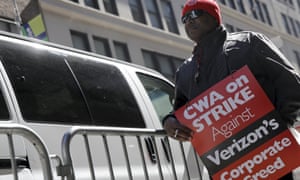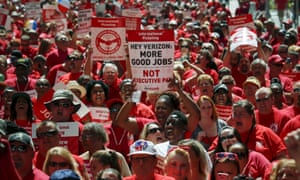labor 'It's Union Busting 101': Documents Reveal Verizon's Attacks on Organized Labor
Unions offer “empty promises and unrealistic expectations” and don’t act with “integrity”, according to internal documents circulated by Verizon’s human resources department and obtained by the Guardian.
In documents given to managers and employees the US’s largest wireless provider encourages its own staff to use anti-union rhetoric and disparages previous unionization efforts within the company.
Several pages focus on the six Verizon retail stores in Brooklyn that voted to join the Communications Workers of America (CWA) in 2014, the first Verizon stores to unionize. The union battles at these stores are used to frame unions as a danger to Verizon and its workers.
“The employees in Brooklyn were highly influenced into voting for the CWA,” the documents allege. “They were swayed by a good sales pitch through empty promises and unrealistic expectations. Unfortunately, the union does not have to sell with integrity, and it was our Brooklyn employees who paid the price.”
“Before you sign anything or even click ‘submit’ online, think hard about joining a union and remember the story of your Brooklyn workers,” the document continues.
Verizon pushed for a union decertification vote in their Brooklyn stores, which workers voted against doing in August 2018.
A member of the Communications Workers of America pickets in front of Verizon corporate offices during a 2016 strike in New York City. Photograph: Brendan Mcdermid/Reuters
In a ‘Questions you may have’ section, Verizon offers further input against unions. The answers claim “the best way to secure jobs is to provide excellent products, services, and customer service,” rather than join a labor union.
Verizon also criticized a 2016 strikeof workers at their Brooklyn retail stores and nearly 40,000 other unionized employees who work as network technicians and customer service reps, citing its impact on “working conditions for our employees and experience for our customers”.
The documents further explain Verizon’s anti-union position. “We don’t believe unions are necessary at Verizon Wireless or that you or your coworkers will be well served by electing a union as your collective voice.” Verizon argues the only difference between unions and non-union-represented employees are the dues union members pay. Verizon defines a union as “an organization whose income comes from taking a portion of the wages from the employees it represents”.
Verizon added: “Instead of treating employees as individuals, the company has to negotiate with the union on behalf of all employees collectively.” The documents claim union representation has declined because state and federal labor laws protect workers free of charge.
The internal Verizon website, marked “for Verizon Wireless management only, not for distribution to non-supervisory employees”, offers leadership training on how to react to any employees who mention or discuss unionizing.
The prompts resemble those offered to Amazon employees in an HR training video leaked in September 2018.
The website includes union awareness refreshers and responses to any perceived CWA organizing and union activity, including responses to union flyers on call center closures and offshoring.
Verizon has run into trouble for previous attempts to ward off union activity. In December 2018, Verizon finalized a settlement with the National Labor Relations Board after the CWA filed a unfair labor practice charge in response to a Verizon employee in Albuquerque, New Mexico, who experienced interrogation and surveillance by Verizon for engaging in union activity.
“When I noticed the change in structure at Verizon, that made me want to start unionizing and organizing two years ago when I took a different position to work at headquarters,” said LaTasha French, an employee for 18 years at the Verizon headquarters in Irving, Texas.
She claimed Verizon has sent union busters to harass her, give her misinformation and offer false promises, like the possibility to work from home. French added the way Verizon human resources had handled complaints of harassment she had made, which included a supervisor joyriding in the wheelchair the company provided for her, had also contributed to her involvement in union efforts.
“I’m not afraid to go up against them because I know I do my job. I know I’m there and available,” French said. “But what I won’t stand for is you’re making billions of dollars on our head and you treat us as modern-day slaves and uneducated. You’re trying to consolidate other departments and you’re not giving the people who take these additional duties any more pay.”
Verizon also criticized a 2016 strike of workers at their Brooklyn retail stores and nearly 40,000 other unionized employees. Photograph: Eduardo Munoz/Reuters
In July 2018, a Verizon retail store in Hazleton, Pennsylvania, successfully voted to unionize. Verizon’s union-busting tactics stopped an effort to hold an election to unionize in Wilkes-Barre, Pennsylvania, around the same time.
“We ended up pulling the petition,” said Darryl Givens, a Verizon employee at the Wilkes-Barre store. “If we lost, we had to wait a year. It was initially five to four. Two people didn’t want to be involved at all.”
He explained Verizon sent executives to the store in response to union activity. “The first thing they do is come and say how awful the union will be for us and if we go union, they can’t do anything special for you. They would come out and, not directly, say ‘unions, sometimes their stores sometimes get closed,’ trying to entice us in any way to vote no,” Givens said. “They would call us in, do forced meetings with us, and go over how awful unions are. Every few days we’d get rotated back in.”
According to Tim Dubnau, an organizing coordinator for the CWA, this is the modus operandi of Verizon in response to any perceived union activity.
“They distort the truth about unions, they imply union workers make less, they distort the truth about dues and strikes. That’s the union busting 101 when you walk into the door,” said Dubnau. “They have a jump team ready at a moment’s notice to have a forced captive audience meeting to warn about the dangers of unions.”
Verizon did not respond to repeated requests for comment.



Spread the word